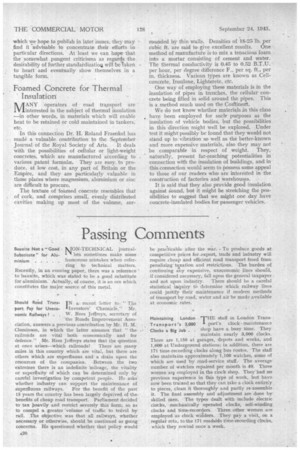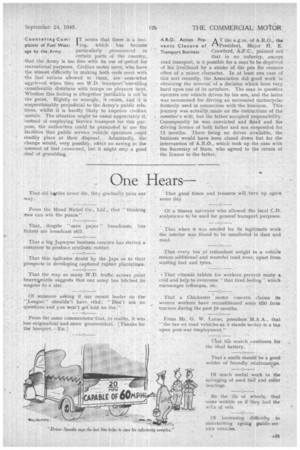Passing Comments
Page 22

Page 23

If you've noticed an error in this article please click here to report it so we can fix it.
Bauxite Not a "Good rekTON-TECHlefICAL journalSubstitute" for Alu" ists sometimes make some
minium humorous mistakes when refer
ring to technical matters. Recently, in an evening paper, there was a reference.' to bauxite, which was stated to be a good substitute for aluminium. Actually, of course, it is an ore which constitutes the major source of this metal, Should Road TransIN a, recent letter .to. " The • port Pay for UnecoLInvestors' Chronicle," Mr, nomic Railways ? . W. Rees Jeffreys, secretary of the Roads Improvement Association, answers a previous contribution by Mr. H. M. Cierninson, in which the latter assumes that " the railroads are vital both economically and for defence." Mr. Rees Jeffreys states that the question at once arises—which railroads? There are many miles in this country which are vital, but there are others which are superfluous and a drain upon the resources of the companies. Between the two extremes there is an indefinite 'mileage, the vitality or superfluity of which can be determined only by careful investigation by competent people. He asks whether industry can support the maintenance of
superfluous railways. For the benefit of the past 15 years the country has been largely deprived of the. benefits of cheap road transport. Parliament decided to tax Deavily and restrict severely this form, so as to compel a greater 'volume of traffic to travel by rail. The objective was that all railways, whether necessary. or otherwise, should be continued as going conceres. He questioned whether that policy would A20
be practicable after the war. To produce goods at competitive prices for export, trade and industry will require cheap and efficient road transport freed from penalizing tvation and restrictions. The burden of continuing any expensive, uneconomic lines shourd, if considered necessary, fall upon the general taxpayer and not upon industry. There should be a careful statistical inquiry to determine which railway lines could justify their maintenance if modern methods of transport by road, water and air be made available at economic rates.
Maintaining London THE staff in London TransTransport's 3,000 I port's clock Maintenance Clocks a Big Job. shop have a busy time. They maintain nearly 3,000 clocks. There are 1,150 at garages, depots and works, and 1,600 at Underground stations; in addition, there are 171 time-recording clocks along bus routes. • The staff also maintains approximately 1,100 watches, some of which are used by road-service staff. The average number of Watches repaired per month is 40. Three women are employed in the clock shop. They'had no • previous experience in this type of work, but have now been trained so that they can take a clock entirely to pieces, clean it thoroughly and partly re-assemble it. The final assembly and adjustment are done by skilled men. The types dealt with include electric
• clocks, mechanically operated clocks, self-winding clocks and time-recorders. Three other women are employed as clock winders. They pay a visit, on a regular rcta, to the 171 roadside time-recording docks, which they rewind once a week.
I T seems that there is a feel ing, which has become particularly pronounced in • certain parts of the country, that the Army is too free with its use of petrol for recreational purposes. Civilian motor users, who have the utmost difficulty in making both ends meet with the fuel rations allowed to them, are somewhat
aggrieved when they see V.D.) transportrtravelling considerable distahces with troops on pleasure bent. Whether this feeling is altogether justifiable is not to the point. Rightly or wrongly, it exists, and it is unquestionably prejudicial to the Army's public relations, whilst it is hardly likely to improve civilian morale. The situation might be eased appreciably if, instead of employing Service transport for this purpose, the authorities could be persuaded to use the facilities that public service vehicle operators could readily place at their disposal. Admittedly, the change would, very possibly, effect no saving in the amount of fuel consumed, but it might stop a good deal of grumbling, Countering Complaints of Fuel Wastage by the,Army . . A.R.O. Action PreAT the a.g.rn. of A.R.O., the vents Closure of r-kPresident, Major 11. E. Transport Business . Crawfurd, A.F.C., pointed out that in no industry, except road transport, is it possible for a man-to be deprived of his livelihciod by a stroke of the pen for reasons often of a minor character. In at least one case of this sort recently, the Association did good work in obtaining the reversal' of a decision which bore very hard upon one of its members. The man in question operates one vehicle driven by his son, and the latter was summoned for driving an uninsured motorcyclet formerly used in connection with-the business. This journey was actually, made on the instructions of the member's wife, but the father accepted responsibility. Consequently he was convicted and fined and the . driving licence of both father' and son suspended for 12 1nonths. There being no driver available, the business would have been closed down but for the intervention of A.R.O., which took up the case with the Secretary of State, who agreed to the return ot the licence to the father.




























































